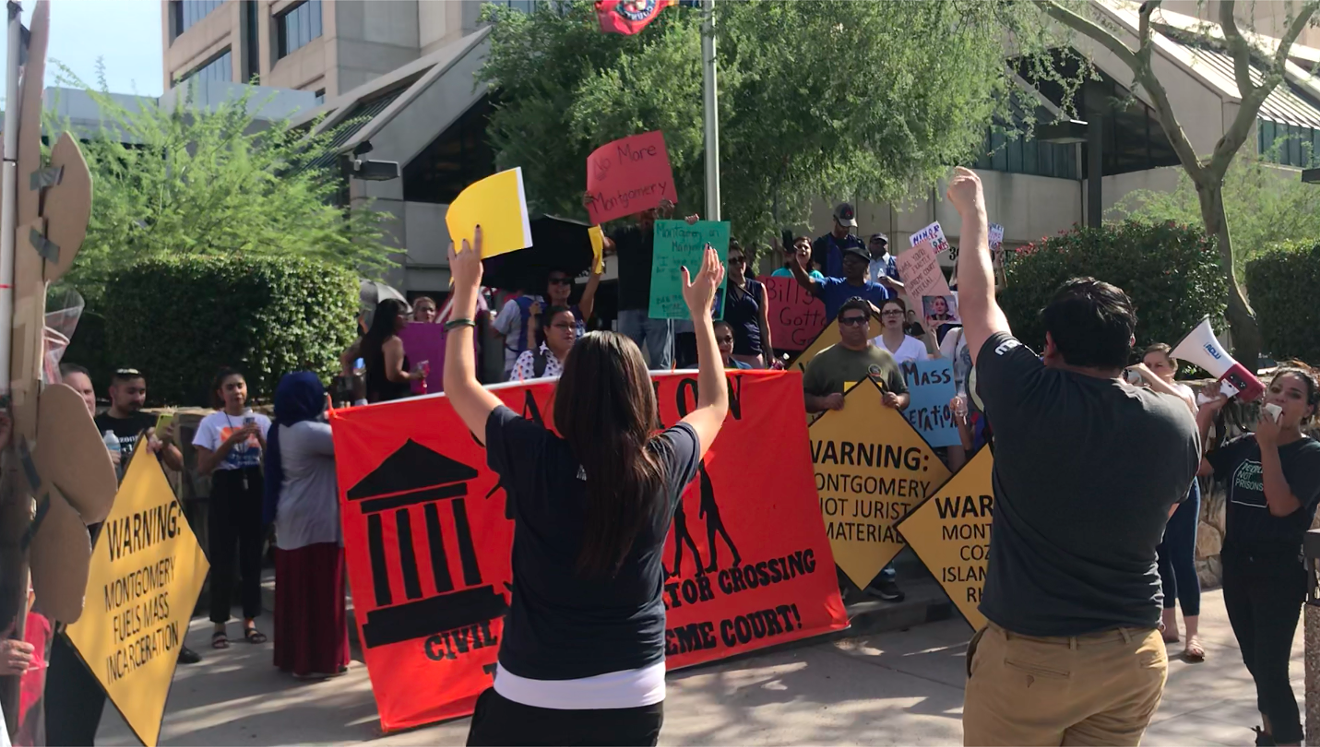Despite sweltering triple-digit temperatures, dozens gathered outside the Maricopa County Attorney's Office on Thursday holding signs like, "Warning: Montgomery fuels mass incarceration," and "Prison is the poison that Bill Montgomery sells as the cure for everything. Don't buy it."
The protest, organized by the American Civil Liberties Union of Arizona, was held to demand Bill Montgomery drop out of the running for a soon-to-be vacant seat on the state Supreme Court.
Montgomery is one of eight applicants who will be interviewed by the Commission on Appellate Court Appointments today. After the interviews, the commission will recommend to Governor Doug Ducey at least three nominees for the seat that will be vacated by Chief Justice Scott Bales when he retires on July 31. Ducey will then choose one to appoint to the state Supreme Court.
Critics say Montgomery has shown he is unable to remain impartial and thus would not be a good fit for a seat on the state's highest court. Protesters say he would make a poor judge, pointing to Montgomery's refusal to provide legal assistance to same-sex couples seeking to adopt, a decision to hire a controversial former FBI agent to conduct "Muslim threat" training, behind-the-scenes efforts to block criminal justice reform, and zealous prosecution of people who use marijuana.
"Over 1,000 ACLU supporters have sent the commission public comment," said Analise Ortiz, campaign strategist for the ACLU of Arizona's Campaign for Smart Justice.
"We know Governor Ducey and Montgomery are good buddies. We want to make sure that the commission knows our concerns, but we want to get a head start on making sure Ducey knows our concerns, too," Ortiz said, urging protesters to go to a link on the ACLU's website where they can "tell Governor Ducey we are deeply deeply concerned that this person who fueled mass incarceration is now trying to be a Supreme Court justice."
This is Montgomery's second bid for the Supreme Court this year; his first attempt never made it past the interview stage after the prior Commission on Appellate Court Appointments questioned whether he could be an impartial judge. Ultimately, the commission rejected Montgomery's bid for John Pelander's seat in March, citing concerns over the pattern of misconduct at the Maricopa County Attorney's Office and a lack of relevant professional experience.
Since then, Ducey has replaced some of the commission members who rejected Montgomery's earlier bid with new members who seemed more supportive of Montgomery. Some criticized Ducey for politicizing the commission: Despite the fact that Arizona law requires that no more than 60 percent of members may come from the same political party, none of the commissioners are Democrats.
One of the new commissioners, Matthew Contorelli, is an independent, though he has voted in Republican primaries in the past and has been a vocal supporter of Ducey. Another independent, Kathryn Townsend, appears to have contributed to Republican candidates in the past. Both approved a motion from Republican Jonathan Paton, seconded by independent Gerald Nabours, to add Montgomery to the list of applicants to be interviewed.
CAUTION! Civil Rights Violator crossing to the Supreme Court. Contact Gov. Ducey NOW and voice your concerns about elected politician Bill Montgomery's potential appointment to the Supreme Court. #BlockBill https://t.co/pJPsatk24n pic.twitter.com/MkDkve3OFN
— ACLU of Arizona (@ACLUaz) July 26, 2019
I'm here because Bill Montgomery's kind of radicalism should never be normalized. #BlockBill https://t.co/ViD75tYXl1
— Sen. Martín Quezada (@SenQuezada29) July 25, 2019
Bill Montgomery's record says it all. He's an elected politician who's let his personal bias influence his policy decisions and it's hurt our families as a result. #BlockBill https://t.co/TkGZMUYNG3 https://t.co/HwegrH9A9O
— ACLU of Arizona (@ACLUaz) July 26, 2019
At the protest, Lenora Reyes-Petroff, a local criminal defense attorney, recounted how Montgomery refused to provide her and her wife with the same legal assistance he provided heterosexual couples seeking to adopt. After her wife gave birth to their child, Reyes-Petroff sought to secure her parental rights by officially adopting her son, since her name was not on the birth certificate as Arizona did not recognize same-sex marriage at the time. (The two had married years earlier in California.)Protest outside @marcoattorney's office as Bill Montgomery interviews for a position on the AZ Supreme Court #BlockBill pic.twitter.com/2Q746G7rsB
— ProgressNow Arizona (@ProgressNowAZ) July 25, 2019
Reyes-Petroff found that Arizona law requires county attorneys to assist with uncontested adoptions for free, so she contacted Montgomery's office, but an employee said Montgomery had directed them not to assist same-sex couples.
After the American Civil Liberties Union of Arizona sent a letter to Montgomery threatening to sue his office for discrimination, Montgomery decided to send all uncontested adoptions to private attorneys. The assistance the county attorney's office provided to adoptive parents was free, but under this new arrangement, the county actually paid private attorneys to do the work.
"Montgomery's personal bias clouded his judgment in this issue so badly that he illegally discriminated, ignored precedent and the letter of law, and even disregarded fiscal responsibility in order to avoid assisting a few same-sex couples," Reyes-Petroff said. "This is not the behavior of someone who is fit for the highest court in Arizona. Montgomery has never shown himself to be capable of being a fair and just jurist."











